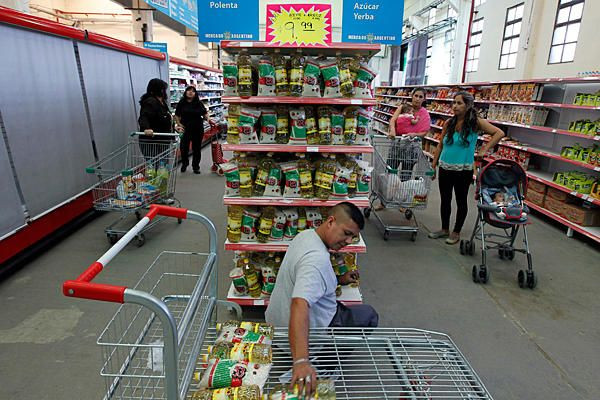Argentina Fights With Inflation As Government Acknowledges Financial Instability And Freezes Prices

Argentines will pay for almost anything in installments – from a dozen eggs to a plane ticket. Credit cards are the most widely used payment method. For some, that's because they have no alternative but to go deeper into debt, but others pay with credit to beat escalating inflation. Indeed, over the past decade prices have been climbing by an average of 21 percent a year.
President Cristina Fernández de Kirchner’s government has been promoting economic growth through consumer spending. For a while it worked: between 2003 and 2011 the country’s gross domestic product grew by an average of 7.5 percent annually, according to data from the International Monetary Fund. There was inflation, yes, but wages increased at a similar rate and in 2012 annual GDP growth plummeted from 8.9 percent to 2 percent.
The World Bank’s forecast shows that 2013 will be slightly more favorable to Argentina, but not by much: 3.4 percent growth. The report also noted that interventionist policies and an unstable government were factors behind the less-than-stellar prediction. Salaries decreased along with the fall in GDP growth rate, but inflation skyrocketed and prices rose by 8.16 percent, said Argentinean media group's Clarín, citing government data; however, analysts and unions said that inflation was actually at 25 percent, Spanish newspaper El País said.
Fernández tends to avoid talking about prices as much as she can, but when she visited Harvard University in September and students inquired about the situation, she couldn't evade the subject. “If inflation is really [at] 25 percent, where do people take the money?” she asked rhetorically. “Buenos Aires’ restaurants are full, malls are packed, and people are spending. If inflation was really 25, 26 percent, the country could explode.” Although it's true that the country hasn't “exploded,” there have indeed been some fireworks. Last Christmas witnessed one of the country’s worst episodes of massive looting in several cities, resulting in two deaths and more than 500 arrests.
Moreover, demonstrations and general strikes occur on practically a monthly basis. The World Bank isn't the only international organization that has criticized the Argentine government over the lack of credibility in its financial statements. The IMF marked a historical milestone last February, when for the first time in its 69 years of existence, it issued an ultimatum to a country – Argentina has until September to come clean with its records. Amid the turmoil, the government made a decision that seemed to acknowledge the issue: In February, it announced the first price freeze, which would keep the retail cost of basic products in supermarket chains controlled until this past April.
On Monday, the government extended that freeze until October on 500 products after manufacturers complained that it was unsustainable to maintain controlled prices. Unions said the measure will help stabilize prices and placate the IMF. “It can certainly control inflation,” Argentine economist Ernest Kritz told El País, “but its effects will be limited if no further macroeconomic measures are taken, like cutting back on imports.”
Follow me on Twitter: @PReyMallen
© Copyright IBTimes 2025. All rights reserved.





















